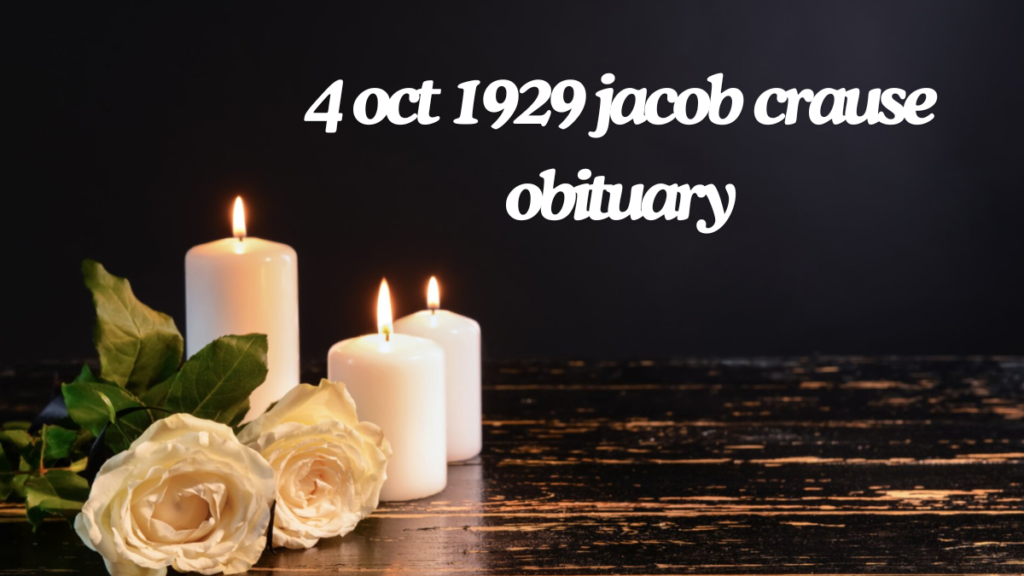
Jacob Crause
Introduction
Jacob Crause’s death on October 4, 1929, had a profound impact on his community, as he was widely regarded as a man of great respect and influence. His passing was deeply felt by those who had been touched by his life, and it underscored the many contributions he made to the people around him. The way obituaries were written during this period reveals much about the values of the time, family structures, and how individual achievements were recognized in a rapidly changing world.
This article delves into Jacob Crause’s life, exploring not only his personal legacy but also the cultural and historical context of his obituary. Through this analysis, we seek to shed light on how Crause’s contributions shaped his community and how his obituary reflects the societal norms of the early 20th century. By understanding the intricacies of his life and the time in which he lived, we gain a deeper appreciation for the lasting imprint he left behind.
Moreover, Crause’s obituary offers a unique window into the broader social dynamics of the 1920s, a time of significant transformation. By examining the language and tone of his obituary, we can see how society viewed death, legacy, and community involvement. The values reflected in such writings reveal much about how individuals were honored, how families were structured, and how communities paid tribute to those who made a lasting impact.
In exploring these themes, we aim to present not just a portrait of Jacob Crause, but also a broader picture of the world he lived in. His life, as recorded in his obituary, serves as a case study for understanding the priorities, beliefs, and traditions of an era that was rapidly evolving. Through this lens, Crause’s story becomes more than just a personal narrative; it becomes part of the collective memory of a time when communities were tightly knit, and individual legacies were celebrated in ways that echoed through generations.
Jacob Crause’s Life and Legacy
Early Life and Education
Jacob Crause, born in the latter part of the 19th century, came of age during a period marked by social and technological change. His upbringing occurred in a family environment that placed a high value on both education and community service. While there are limited details available about his early years, it is clear that these formative experiences played a significant role in shaping the man he would become and the contributions he would later make to his community.
It is likely that Crause received his early education at local schools, where he developed a passion for learning that stayed with him throughout his life. The values instilled in him during this time – a dedication to personal growth and a sense of duty to those around him – became central to his identity. His academic foundation was not just a stepping stone for his career but also deeply influenced how he engaged with the community and the broader world as an adult.
As Crause matured, he began to apply the lessons he had learned from his family and schooling in meaningful ways. His educational background, combined with a strong sense of responsibility, equipped him to contribute to his community in various capacities. Whether through civic engagement, professional endeavors, or other avenues of service, Crause’s early life undoubtedly laid the groundwork for a legacy that would endure beyond his lifetime.
By reflecting on his upbringing and education, we gain a clearer understanding of the values that guided Jacob Crause throughout his life. His dedication to fostering a positive impact within his community speaks to a generation that prized hard work, integrity, and a commitment to the common good. As we explore his journey, we are reminded of the lasting importance of early life experiences and how they shape the contributions of individuals to society.
Family and Career
As Jacob Crause transitioned into adulthood, he established a fulfilling family life and pursued a meaningful career, both of which became essential aspects of his identity. His marriage marked a pivotal point in his life, and becoming a father further shaped his values, deepening his sense of responsibility and purpose. His family was a source of joy and strength, grounding him through the challenges and successes of his professional and personal journey. The close bonds he shared with his loved ones provided him with the motivation to strive for a better future, not just for himself but for his family and the broader community.
In his professional life, Jacob became involved in several local businesses and enterprises, demonstrating a deep-rooted commitment to the community he held dear. His career path reflected his desire to make a positive impact, as he sought out roles where he could contribute meaningfully to the betterment of those around him. Known for his tireless work ethic and strong sense of duty, Jacob was the type of person who went beyond the expected, always willing to lend a hand or spearhead local projects that benefited the community as a whole.
Whether through his business endeavors or his civic engagements, Jacob’s dedication was evident in everything he did. He became a respected figure in the local area, not only for his professional contributions but also for his role in supporting and uplifting community initiatives. His proactive involvement in various causes underscored his belief in the power of collective effort to bring about meaningful change.
The values Jacob embraced—hard work, family loyalty, and a commitment to service—were central to his legacy. He was not just a businessman or a community leader; he was a devoted family man who sought to balance his professional responsibilities with his personal life. This blend of personal integrity and public service earned him the respect of his peers and a lasting place in the hearts of those who knew him.
By exploring Jacob’s dual roles as both a family man and a community leader, we gain insight into a life well-lived, one where the bonds of family and the spirit of service intertwined to create a lasting legacy. His efforts, both at home and in his professional endeavors, left a lasting imprint on those who had the privilege of knowing him.
Contributions to the Community
Jacob Crause’s impact on his community extended far beyond simple participation—he was a driving force behind many local efforts aimed at improving the lives of those around him. His commitment to community service was not passive; he actively sought out opportunities where he could make a tangible difference. Known for his initiative and leadership, Jacob played a key role in various organizations that focused on enhancing the well-being of local residents. His passion for service, combined with his natural leadership abilities, allowed him to spearhead initiatives that brought people together and addressed pressing community needs.
One of Jacob’s notable contributions was likely his involvement in charitable efforts. He was deeply committed to helping those less fortunate, working to ensure that resources were available to those in need. Whether through direct financial support, organizing fundraising events, or contributing his time and skills, Jacob’s charitable work reflected his belief in the importance of compassion and collective responsibility. His generosity and willingness to go above and beyond in his charitable endeavors left a lasting impression on his community, reinforcing his reputation as someone who cared deeply about the welfare of others.
Jacob was also known to participate in and possibly lead community events aimed at strengthening the social fabric of his town. He understood the importance of fostering unity and cooperation among residents, believing that a strong community could achieve great things. His involvement in these events went beyond simple attendance—he likely played an active role in planning and executing initiatives that brought people together, reinforcing the bonds that held the community close. Whether organizing local fairs, supporting educational programs, or being involved in civic organizations, Jacob’s contributions were instrumental in promoting a sense of togetherness.
His leadership extended beyond mere participation; he was often at the forefront, guiding others and setting an example through his actions. Jacob’s commitment to service was rooted in the belief that by working together, the community could overcome challenges and thrive. His ability to inspire and motivate others to get involved reflected his deep-seated values of cooperation, kindness, and dedication to the common good.
By reflecting on Jacob’s role in his community, we can appreciate the profound and lasting influence he had. His efforts to uplift others, foster unity, and promote service made a significant difference, leaving a legacy that continued to benefit the community long after his passing. Through his tireless work, Jacob exemplified the spirit of giving and demonstrated the powerful impact one person can have when they devote themselves to the betterment of others.
Achievements and Milestones
Jacob Crause’s life was marked by numerous milestones that underscored his deep commitment to service and his enduring influence within the community. Though he may not have sought public recognition, his dedication did not go unnoticed. Over the years, Jacob’s hard work and contributions earned him the respect, admiration, and gratitude of those around him, reflecting the profound impact he had on his fellow residents.
Throughout his life, Jacob was involved in a variety of significant community projects. His participation in these initiatives was not limited to a supporting role—he often took the lead, helping to organize, execute, and bring these projects to fruition. Whether it was civic improvement efforts, local infrastructure developments, or programs aimed at enhancing the quality of life for residents, Jacob’s involvement was crucial. His ability to mobilize others and his hands-on approach in these endeavors highlighted his dedication to making meaningful, lasting contributions.
Although Jacob did not pursue accolades, his efforts were often met with public acknowledgment. He was likely recognized for his service through formal awards or community honors that celebrated his contributions. These moments of recognition were a testament to the countless hours he devoted to improving the lives of those around him. The community’s appreciation for his tireless work served as a reflection of the widespread respect he commanded.
Beyond formal recognition, perhaps the most meaningful acknowledgment of Jacob’s impact came from the heartfelt gratitude of the people he served. His neighbors and fellow community members likely expressed their appreciation in personal and genuine ways, recognizing the difference Jacob had made in their lives. From organizing charity drives to leading local events, Jacob’s actions inspired others to contribute as well, creating a ripple effect that benefited the entire community.
Each milestone in Jacob’s life, whether public or personal, contributed to the lasting legacy he left behind. His service to the community was woven into the fabric of the town, and his achievements became part of the collective memory of those who knew him. These milestones are a testament to a life lived with purpose, driven by a desire to uplift others and create positive change. Jacob’s legacy endures not just in the physical projects he helped complete, but in the spirit of unity and service he fostered within the community.
The Obituary: A Window into the Past
Language and Style
Jacob Crause’s obituary offers a heartfelt reflection of his life and captures the emotional response of the community at his passing. Obituaries from the 1920s often employed formal and ornate language, and Jacob’s would have been no exception. Written in a time when such tributes were designed to both honor the deceased and provide comfort to grieving families, his obituary likely used grand phrasing to express the sorrow of his loss and the gratitude for the life he lived.
The obituary would have conveyed the community’s deep respect for Jacob, using language that emphasized the qualities that made him beloved. Phrases celebrating his compassion, kindness, and unwavering dedication to others would have been prominent. These words would not only highlight Jacob’s personal character but also serve as a testament to the values he stood for. His reputation for putting others first, his involvement in local projects, and his commitment to service would have been noted, illustrating the profound impact he had on the people around him.
Particular expressions of gratitude might have been used to capture the collective mourning of the community. Phrases like “a pillar of strength,” “a life devoted to service,” or “he will be sorely missed” would likely have appeared, reflecting the emotional weight of his passing. The formal style of the obituary would lend a dignified tone to the tribute, ensuring that Jacob’s memory was preserved with the utmost respect and honor.
In addition to these sentiments, the obituary may have included mentions of Jacob’s family, noting his role as a devoted husband and father. His family’s sorrow and the support they received from the community would have been acknowledged, creating a sense of shared mourning and solidarity among those who knew him.
Ultimately, Jacob’s obituary would not have merely listed his accomplishments but served as a reflection of the admiration and affection felt for him. The words used to describe his legacy would resonate with the values he embodied throughout his life—kindness, generosity, and a commitment to the greater good. This tribute would remain a lasting reminder of the impact Jacob Crause had on his community, offering future generations a glimpse into the life of a man who was both deeply respected and dearly loved.
Values and Beliefs
The obituary for Jacob Crause offers a rich insight into the values and beliefs that were significant during his lifetime. Family clearly occupied a central place in Jacob’s life, and it is likely that his obituary underscored his dedication as a devoted husband and father. Such emphasis on familial bonds reflects the era’s societal norms, where the family unit was often viewed as the cornerstone of individual identity and community cohesion.
Additionally, Jacob’s strong religious convictions, which were common in the community of that time, likely influenced how he was remembered and celebrated. His faith not only shaped his personal life but also guided his interactions with others, providing a moral framework that emphasized compassion, service, and community support. These deeply held beliefs would have been woven into the narrative of his life as presented in the obituary, illustrating how they informed his actions and relationships.
The sentiments expressed in Jacob’s obituary highlight the profound importance of family, faith, and community connections in his life. In an era when social networks were crucial for personal and communal support, Jacob’s relationships were foundational to his identity. His commitment to his family and his active participation in local community initiatives likely fostered a sense of belonging and responsibility that resonated deeply with those around him.
Moreover, the language used in the obituary likely reflected the collective values of the community, emphasizing themes of love, sacrifice, and togetherness. By portraying Jacob as a figure who embodied these ideals, the obituary not only honored his memory but also reinforced the social fabric of the community that cherished him. This focus on family and faith in the obituary serves as a testament to the enduring significance of these elements in shaping individual lives and fostering a sense of community cohesion.
As we reflect on Jacob Crause’s life through the lens of his obituary, it becomes clear that his legacy is intertwined with the values of family, faith, and community. These elements were not merely aspects of his identity; they were integral to the way he navigated the world, leaving an indelible mark on those who knew him and the community he served. Jacob’s life and the sentiments captured in his obituary continue to resonate, reminding us of the profound impact one individual can have within the larger tapestry of community life.
Comparative Analysis
When placed alongside other obituaries from the same era, Jacob Crause’s tribute reveals a tapestry of shared themes and values. Obituaries from the 1920s frequently highlighted ideals such as hard work, unwavering family loyalty, and a deep commitment to community service. These recurring motifs underscore a societal framework that held these values in high regard, reflecting the aspirations and priorities of the time.
By analyzing a range of obituaries from this period, we can discern notable trends in the ways individuals were commemorated. The emphasis on service to others, adherence to moral principles, and the strength of familial ties served as a unifying thread, connecting the lives of many, including Jacob’s. This collective focus on virtue and contribution reveals how society viewed individuals not merely in terms of personal accomplishments, but also through the lens of their relationships and the positive impact they had on their communities.
In Jacob’s case, the emphasis on hard work resonates strongly with the values that were celebrated in his contemporaries’ obituaries. Many tributes from this time extolled the virtues of industriousness and perseverance, recognizing those who labored diligently to support their families and better their communities. Jacob’s own life, characterized by a strong work ethic and a dedication to serving others, aligns perfectly with these ideals, highlighting how he embodied the spirit of his time.
Additionally, the theme of family loyalty is often prominent in the obituaries of the 1920s. During this era, family was regarded as a vital social unit, and individuals were frequently remembered for their roles as devoted spouses, parents, and siblings. Jacob’s obituary likely emphasized his commitment to his family, portraying him as a loving husband and father, which reflects the societal expectation that family relationships were central to one’s identity and legacy.
Finally, the collective focus on community service in these obituaries illustrates a shared belief in the importance of contributing to the greater good. Many individuals were celebrated for their volunteer work, involvement in local organizations, and efforts to uplift those in need. Jacob’s active participation in community initiatives would have placed him within this framework of individuals who made a difference in the lives of others, reinforcing the idea that personal fulfillment was often linked to serving the community.
In conclusion, Jacob Crause’s obituary not only highlights his individual life and contributions but also serves as a reflection of the broader societal values of his time. By examining the common themes present in obituaries from the 1920s, we gain a deeper understanding of how individuals were remembered and the values they embodied. This shared narrative of hard work, family loyalty, and community service continues to resonate, reminding us of the enduring significance of these ideals in shaping our collective memory.
Societal Context and Historical Significance
The 1920s: A Decade of Change
The 1920s marked a significant era of transformation, characterized by profound shifts in societal norms and cultural expressions. In the wake of World War I, communities across the globe underwent a wave of changes that redefined attitudes toward both life and death. This decade was not merely a continuation of previous trends; it was a vibrant tapestry woven from threads of innovation, creativity, and uncertainty.
One of the most notable phenomena of the 1920s was the emergence of the Jazz Age, a cultural movement that introduced new forms of music, dance, and art. Jazz, with its improvisational style and energetic rhythms, became the soundtrack of a generation seeking liberation and self-expression. Dance halls and speakeasies flourished as people flocked to enjoy the exhilarating rhythms that defined this era. This newfound cultural freedom influenced personal interactions, fashion, and social gatherings, leading to a more carefree lifestyle that celebrated individualism.
Despite the buoyancy of economic prosperity during this time, an undercurrent of uncertainty lingered. The post-war economic boom brought about a sense of optimism, but it also gave rise to concerns about sustainability and the future. The stock market soared, leading many to indulge in a lavish lifestyle, yet the specter of potential economic downturns loomed over the horizon. This duality of exuberance and apprehension shaped the way people viewed their lives and the world around them.
As societal norms shifted, so did perceptions of life and death. For many individuals, the decade was a complex interplay of excitement and trepidation. The exhilaration of newfound freedoms often coexisted with the haunting memories of a devastating war. The values and attitudes that permeated daily life during the 1920s were influenced by these contrasting emotions. People sought to celebrate life with greater fervor, embracing joy and spontaneity, while also grappling with the realities of loss and mortality.
These changes in societal attitudes were reflected in various aspects of life, including family dynamics, community interactions, and cultural practices. As families navigated this transformative landscape, traditional values were often reassessed. The roles of men and women began to shift, with women gaining more independence and visibility in the public sphere, particularly through movements like suffrage. This evolution in gender roles influenced the way families operated, creating new dynamics that challenged long-standing conventions.
In summary, the 1920s was a decade marked by profound transformations that reshaped societal values and attitudes. The excitement of the Jazz Age, coupled with economic prosperity and underlying uncertainties, created a unique environment that influenced how individuals perceived their lives and the inevitability of death. By examining this era, we can gain valuable insights into the historical context that shaped the lives of those who lived through it, revealing the complexities of human experience in a rapidly changing world.
Reflection of Values and Attitudes
Jacob Crause’s obituary serves as a reflection of the prevailing societal attitudes of his era. It encapsulates various aspects, including notions of class, gender roles, and the responsibilities individuals held within their communities. During this transformative time, family and religious affiliations were regarded as essential components of a person’s identity, shaping how individuals were remembered and honored.
In his obituary, Jacob’s steadfast dedication to his family is likely emphasized, painting a picture of him as a devoted husband and loving father. This portrayal aligns with the broader societal expectations of the 1920s, a time when men were often perceived as the primary providers and protectors of their households. Such representations not only highlight Jacob’s personal virtues but also mirror the norms of masculinity that were prevalent in the community at that time.
Furthermore, the emphasis on family connections in Jacob’s obituary speaks to the significant role that familial bonds played in shaping individual identity during the 1920s. Individuals were often evaluated based on their roles within their families, with a strong focus on loyalty and support. By highlighting Jacob’s commitment to his family, the obituary not only honors his legacy but also reinforces the societal values that prioritized family unity and responsibility.
Community Impact
Jacob Crause’s life and subsequent passing left a profound mark on his local community. His numerous contributions cultivated a strong sense of unity and purpose among the residents, making his death more than just a personal loss. It echoed through the community, prompting deep reflections on his legacy and the vital importance of civic engagement.
In times of sorrow, communities often unite to commemorate the lives of those who have departed. Jacob’s passing likely inspired gatherings where neighbors came together to share stories, reminisce, and celebrate his impactful life. These moments of remembrance not only honored Jacob’s memory but also reinforced the connections among residents, reminding them of the collective spirit that he had fostered throughout his time in the community.
Such communal gatherings serve as a testament to the relationships and bonds that Jacob nurtured during his life, reflecting the enduring influence he had on those around him. In these shared experiences, the community found solace and strength, recognizing that Jacob’s spirit lived on through their collective memories and continued commitment to the values he embodied.
FAQs
1. Who was Jacob Crause?
Jacob Crause was a respected figure in his local community, known for his significant contributions and commitment to civic duty. His life and values resonated with those around him, making his passing a profound loss.
2. What impact did Jacob’s death have on the community?
Jacob’s death prompted deep reflections on his legacy and the importance of community engagement. It fostered unity among residents as they came together to honor his memory, share stories, and celebrate his life.
3. How did the community respond to Jacob’s passing?
In the wake of his death, the community likely organized gatherings to commemorate Jacob. These events provided a space for residents to express their grief and solidarity while celebrating the values he upheld.
4. What values did Jacob embody?
Jacob was known for his strong work ethic, dedication to service, and commitment to family and community. His life reflected the societal values of loyalty, unity, and civic responsibility prevalent during his time.
5. How does Jacob’s legacy continue to influence the community today?
Jacob’s legacy continues to inspire the community through the values he championed. His contributions serve as a reminder of the importance of civic duty and the impact one individual can have on fostering unity and purpose.
Conclusion
Jacob Crause’s life and legacy extend far beyond his years. His unwavering dedication to his family and community created lasting connections that continue to resonate today. The outpouring of grief following his passing exemplifies the profound impact he had on those around him, reinforcing the importance of civic engagement and the bonds that unite individuals within a community.
As we reflect on Jacob’s contributions and the values he embodied, it becomes clear that his spirit lives on through the collective memory of his community. His story serves as a reminder that each individual’s commitment to service and unity can significantly shape the lives of others, fostering a sense of purpose that endures through generations. In honoring his memory, the community is encouraged to uphold the ideals Jacob championed, ensuring that his legacy remains a guiding light for future generations.
Stay engaged for the latest news and alerts. The Verge Blog




